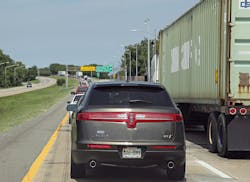A combination of more trucks on the road, especially in urban areas, along with the aging of America’s highway infrastructure and more freight demand spurred by e-commerce are the main reasons behind the growth in truck “bottlenecks” across the country, according to the American Transportation Research Institute (ATRI).
ATRI released this week its 2018 list spotlighting the 100 most congested truck bottlenecks in America, with Atlanta's ‘Spaghetti Junction,’ the intersection of Interstates 285 and 85 North, taking the top spot for the third straight year.
Fort Lee, NJ’s I-95 at SR 4 [George Washington Bridge] was second, with Chicago’s I-290 at I-90/I-94 placing third.
In a conference call with reporters, Dan Murray, ATRI’s vice president, said there were a couple of major reasons for the growth truck bottlenecks, with one old and one new.
“There’s never enough capacity in the system; we’ve been seeing that for a decade,” he explained. “Clearly, the federal fuel tax hasn’t been raised since 1993 so we’re not seeing [highway] investment at the federal level. The roads, infrastructure and bridges we have today are quite constrained. We’re seeing more and more use of truck restrictions and bridge-load limits, with bridges becoming obsolete. So to some degree the infrastructure itself is very constrained.”
Murray added that the U.S. is also experiencing a “pretty substantial shift” in the economy toward a hub and spoke system, where Amazon and other e-commerce players are building multiple warehouses in urban areas in response to the requirements of consumers.
“We’re watching truck trips get shorter and truck odometers get smaller, but there are many more trucks, with a dramatic increase in small to medium trucks,” he emphasized. “We’re seeing what may be described as a sea change in the design of both industry and commerce. It’s sort of a perfect storm of all of those effects.”
Since 2002, ATRI has collected and processed truck GPS data in support of the Federal Highway Administration's Freight Performance Measures (FPM) initiative. The FPM program develops and monitors a series of key performance measures on the nation's freight transportation system. ATRI now converts its truck GPS data set into an ongoing analysis that is used to quantify the impact of traffic congestion on truck-borne freight at 300 specific locations.
Rebecca Brewster, ATRI’s president and COO, explained on the call that some of the cities on the list move up and down depending on various factors.
“Chicago was number one for a number of years, to the point where the state of Illinois decided to make a change to that particular stretch of infrastructure and committed significant dollars to a redesign and rebuild [of the area],” she said. “That construction is still underway and expected to be completed in 2019. So though there are still delays there, we should start to see it go down the rankings.”
Similarly, in Louisville, KY, construction of a new bridge helped it move in the bottleneck rankings from fourth place to tenth – moving lower on this list is a good thing – while traffic speeds increased 19%.
“We look at year-over-year speed changes. Lower speeds year-over-year means the congestion is worse; higher [speeds] means better,” Brewster said. “Often times better points to the completion of an infrastructure project.”
Drivers literally pay the price for bottlenecks, added Murray.
“We had previously researched the amount of time drivers took searching for truck parking,” he stressed. “It cost nearly 10% of their annual wages. With bottlenecks we’re talking hundreds of millions of dollars cost by delays. The drivers, most of who are paid by the mile, would be expected to lose a certain percentage of income, particularly those who traverse urban areas.”
As e-commerce grows, and its growing dramatically, with as much as one in five dollars being purchased online, the ability of the supply chain to react as quickly as consumers desire is becoming more and more challenging, Murray pointed out.
“It ends up raising the cost of goods because drivers are still paid and goods are not being delivered as quickly or as on time as consumers demand,” he explained. “So the ability to sort of migrate our economy from brick and mortar to e-commerce is going to be very strained by the inability of the trucks to deliver quickly.”
About the Author
Michael Catarevas
Michael Catarevas is a former managing editor at FleetOwner. He wrote for the publication from 2017 to 2020.
